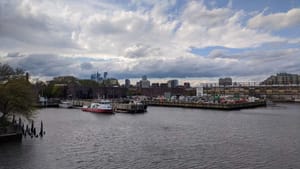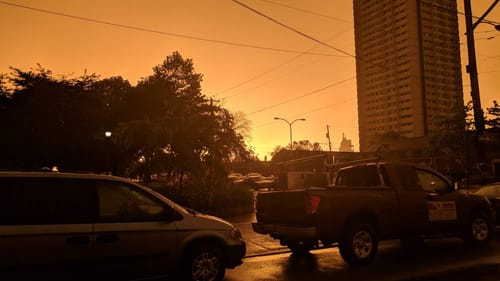Stay in the Loop
BSR publishes on a weekly schedule, with an email newsletter every Wednesday and Thursday morning. There’s no paywall, and subscribing is always free.
Nice weather we’re not having
Especially in Philly, don't ignore the storm brewing around a global pandemic

I wanted to be a meteorologist when I was coming up. I remember revealing that during an assignment in kindergarten and saying it with conviction. Cecily Tynan on ABC Action News was my role model (and probably my first TV crush). My VHS copy of Twister was worn out by the time I hit adolescence. I’m fascinated by rain, and I love a good thunderstorm. But my relationship with the weather has more to do with my becoming an advocate for change than being a bemused window gazer.
And in the spirit of the 50th anniversary of Earth Day, I’ve got some tea to spill about how we need to wake up now before it’s too late. Because I’m upset, and y’all, I don’t get upset publicly about anything.
The truth I’m sweating
Nothing frightens me more than climate change. I like to think I’m a pretty brave dude, but I’m as terrified of the weather as I am enamored by it. I’ve written about reverse Seasonal Affective Disorder before, and I’m already dreading the heat as April wanes. Summer is coming, and it’s a sticky, clammy, and callous prelude to how temperatures will swell in the future.
The hard truth that really gets me sweating is that climate change is a result of long-term policy failure. Much like the COVID-19 pandemic, which could have easily been prevented or at least been mitigated before it erupted.
The pandemic, the subsequent economic crash, and climate change are linked. According to a video essay from Al Jazeera, CO2 emissions from China are down 25 percent, Italy has seen drastic drops in nitrogen dioxide concentrations, and carbon monoxide levels in NYC have dropped 50 percent. This reprieve is happening right at home, too.
And the air is just fresher. But it won’t last once stay-at-home orders subside—you know, the best time for us to actually enjoy that fresh air.
“Past experience suggests that emission declines during economic crises are followed by a rapid upsurge,” said Petteri Taalas in a World Meteorological Organization article. “We need to change that trajectory.”
Time runs out
The World Health Organization says four million people die due to air pollution every year. A viral pandemic is exacerbated by this—pollution compromises immune systems and attacks the lungs.
Dr. Jacqueline Klopp, the co-director of the Center for Sustainable Urban Development Earth Institute at Columbia University notes in an essay that “as we rebuild our economy after the crisis passes, we simply cannot proceed as if our fossil fuel economy and car oriented, sprawling urban development and consumption patterns have nothing to do with rising pandemics, serious chronic public health problems, climate change, and the great inequalities that threaten our cities and regions and their residents.”
A city like Philadelphia is already seeing significant impact from climate change, and we’re not making it any better on ourselves. Each year, we collectively waste the equivalent of a millennium sitting in traffic, and our skyline is a bigger source of greenhouse-gas emissions than cars. And don’t even get me started on the South Philly oil refinery that almost caused Jawnobyl. And while the Kenney Administration has systems in place to cut our emissions by 80 percent by 2050, it isn’t enough. We have work to do, but are we going to get it done?

You know the saying: we have only 10 years left, if that.
I’m no meteorologist, but…
Many people deny climate change. They adamantly argue that sea levels aren’t rising, ice caps aren’t melting, and Antarctica isn’t seeing record temperatures. They insist that devastating wildfires in Australia and California aren’t caused by climate change. This becomes especially nonsensical as we see images of how air pollution is receding significantly in places like Delhi as a result of reduced emissions during quarantine.
“The weather is fine; we don’t need to worry about climate change” sounds a lot like how we reacted to COVID-19 in January and February. It’s just another flu, right? It’ll pass.
I’m exhausted. I want to care, like I wanted to care when I longed to become a meteorologist. I study the weather; I obsess over how everything is connected. Our economic crash, COVID-19, and climate change are not individual problems we can extract from a complex, interconnected global system. Our social, economic, environmental, and healthcare infrastructures are failing us, and I’m tired of the resistance and the denial of the evidence that is now, more than ever, right in front of us.
I get it, we’re all afraid of change. As people living in the United States, many of us have privileges and luxuries that make this pandemic—and climate change—easier to grapple with than other threats. Places like India have seen a dreadful response by their government. So far, it’s not COVID-19 itself that’s going to displace millions of folks there; the response to it will prove far more deadly.
Our response to climate change is going to have the same sort of impact. At what point will we start to care together? That’s what I’m looking for in our forecast, because it’s hard to care alone.
Sign up for our newsletter
All of the week's new articles, all in one place. Sign up for the free weekly BSR newsletters, and don't miss a conversation.

 Kyle V. Hiller
Kyle V. Hiller